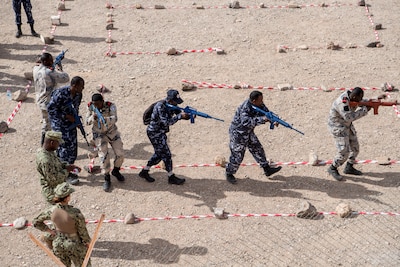
WASHINGTON —
The commander of U.S. Africa Command told the Senate Armed Services Committee today that his command is engaged throughout the continent to encourage allies and partners and strengthen the rule of law.
Marine Corps Gen. Thomas Waldhauser said his combatant command is engaged in fulfilling the needs of the National Defense Strategy in Africa, especially in light of the main threat — the return of global competition from Russia and China.
Africa is a huge continent with diverse people. Overall, the continent suffers from a lack of infrastructure and development. In some countries, corruption is rampant and the basic needs of their citizens are ignored.
Extremism, Competition
Some countries on the continent — such as Somalia, Libya, Nigeria, Niger and others — suffer from the plague of violent extremism. The al-Shabab terror group in Somalia still controls areas in that unfortunate nation. Boko Haram in West Africa threatens Nigeria, Niger, Mali and the countries of the Lake Chad region. There are others.
Piled on top of this is the resurgence of great power competition and China is the most active participant on the continent, Waldhauser said.
“Taken comprehensively, the overall U.S. strategic interests in Africa are clear,” he said.” “Prevent the undermining of our alliances or destabilization of Africa nations, counter violent extremist organizations, decrease the potential for Africa to become a failed continent, protect U.S. citizens and the homeland and advance American influence including economic opportunities and transactions.”
Whole-Of-Government Approach
Waldhauser said a whole-of-government approach is the centerpiece for everything the command does on the continent. Command officials work closely with colleagues in the State Department and the Agency for International Development. “U.S. strategic interests on the continent cannot be solely advanced through the use of military force alone,” he said. “As such, Africom uses the military tool in concert with diplomacy and development efforts to help negate the drivers of conflict and create opportunity.”
Somalia is a good example of this. Yes, there is a military aspect to countering al-Shabab, Waldhauser said, but the command works closely in Mogadishu with the U.S. ambassador and the resident office of USAID.
“In Libya, our counterterrorism commitment supports the U.S. charge [d‘affaires], who works closely with the international community to prevent civil conflict and facilitate political reconciliation process,” he said.
The command participates in exercises and operations throughout the continent. All are meant to strengthen local security, facilitate alliances in the regions and support rule of law initiatives.
“Our partnered networks and influence ensures access for U.S. forces in times of crises to protect our personnel and facilities on the continent, such as in Djibouti and area with strategic significance to multiple combatant commands,” Waldhauser said.
The command emphasizes engagements and capacity building among the African nations, he said, and African military personnel study at American schools and participate in exercises and operations alongside American personnel.



